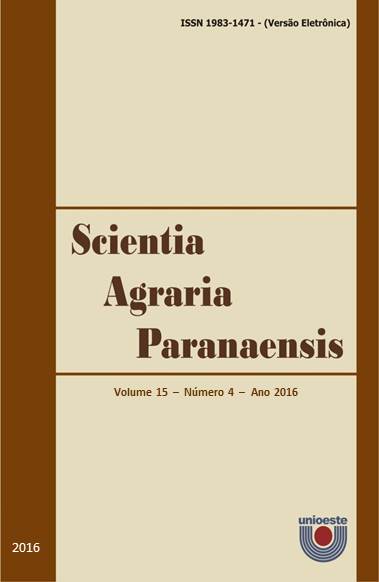Seed germination of yellow passion fruit imbibition in solutions in three substrates
DOI:
https://doi.org/10.18188/sap.v15i4.12186Keywords:
embebição, fito-hormônio, Passiflora edulis f. flavicarpa.Abstract
The propagation of passion fruit is done through sexual way, however, there is a genetic variability in orchards, as well as germination is slow and variable. Thus, it is recommended to use plant growthThus, the aim of the present study was to evaluate the passion fruit seeds emergence in gibberellic acid and substrates. The experiment was conducted in Unioeste between May and June/2014. We used commercial seeds of passion fruit. For the germination tests were used three substrates being germitest paper, vermiculite and sand. The substrates were sterilized in an autoclave, and deposited in Gerbox® box sterilized with 70% alcohol. Thereafter the seeds were soaked for 10 seconds in a solution containing 500 mg L-1 of gibberellic acid (GA3), and/or distilled water. After the treatments, the seeds were kept in germination BOD, with 2 ºC without photoperiod control. Under these conditions, the seeds remained for 30 days, conducting daily counts of the number of germinated, thereby determining whether to germination percentage, overall germination and emergence speed index. The experimental design was completely randomized in a factorial 3x2, with four replicates and 25 seeds per repetition. The use of gibberellic acid imbibition increased germination rate as well as the total percentage of germination. The use of AG3 along with germitest paper and vermiculite substrates provided better germination of passion fruit seeds.
Downloads
Published
How to Cite
Issue
Section
License
Aviso de Direito Autoral Creative Commons
Política para Periódicos de Acesso Livre
Autores que publicam nesta revista concordam com os seguintes termos:
1. Autores mantém os direitos autorais e concedem à revista o direito de primeira publicação, com o trabalho simultaneamente licenciado sob a Licença Creative Commons Attribution que permite o compartilhamento do trabalho com reconhecimento da autoria e publicação inicial nesta revista.2. Autores têm autorização para assumir contratos adicionais separadamente, para distribuição não-exclusiva da versão do trabalho publicada nesta revista (ex.: publicar em repositório institucional ou como capítulo de livro), com reconhecimento de autoria e publicação inicial nesta revista.
3. Autores têm permissão e são estimulados a publicar e distribuir seu trabalho online (ex.: em repositórios institucionais ou na sua página pessoal) a qualquer ponto antes ou durante o processo editorial, já que isso pode gerar alterações produtivas, bem como aumentar o impacto e a citação do trabalho publicado (Veja O Efeito do Acesso Livre).
Licença Creative Commons
Esta obra está licenciada com uma Licença Creative Commons Atribuição-NãoComercial-CompartilhaIgual 4.0 Internacional, o que permite compartilhar, copiar, distribuir, exibir, reproduzir, a totalidade ou partes desde que não tenha objetivo comercial e sejam citados os autores e a fonte.


